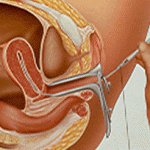Articles tagged with: pregnancy
Artificial insemination, IUI procedure »
There are many factors that determine how successful an IUI procedure will be. Some of these are the same factors that apply to any fertility treatment: age of the female, ovarian function, fallopian tube blockage, pelvic adhesions and other additional causes of infertility, whether fertility medications were also used etc.
One important factor that is specific to intrauterine insemination is the amount of motile sperm that is inserted into the uterus. Several studies have indicated that if a man has a low number of progressively motile sperm after the sperm …
Artificial insemination, ICSI procedure »
In certain cases, manipulation of the embryo can enhance implantation and subsequent pregnancy. Common practice is to use acidified Tyrode’s solution (pH 2.35) to thin the zona pellucida. An increase in implantation from 18 % to 25 % is achievable for oocytes with poor prognosis with this intervention, refeffed to as assisted hatching. Assisted hatching is not applicable only for male factor infertility, in fact, it is a treatment for specific defects in embryo development or oocyte abnormalities. However, it is a micromanipulation technique that is routinely performed during IVF …
Artificial insemination, ICSI procedure »
The bypass of natural barriers to fertilization, possible genetic defects in men with severe male infertility, and the use of severely abnormal sperm for intracytoplasmic sperm injection has engendered concern over the impact of ICSI on the genetic complement of the offspring . Previous studies have suggested no increase in birth defect rates when IV-F alone was used to induce conception. Van Steirteghem reported no increase in the congenital malformation rate in their center after ICSI when compared with the general population. Of 877 children born after ICSI procedures, 23 …
Artificial insemination, ICSI procedure »
One of the largest series reporting results using IVF/ICSI was from Van Steirteghem et al. at The Brussels Free University in Brussels, Belgium. In their preliminary report on 150 couples who underwent 150 consecutive treatment cycles, 1409 oocytes were injected and 830 were successfully fertilized for a fertilization rate of 59 percent. A total clinical pregnancy rate of 35 percent was achieved. The fertilization rate in this study was not influenced by the standard semen characteristics of concentration, motility, and strict criteria morphology. In another largest case serie on ICSI …
Artificial insemination, IUI procedure »

Intra-Uterine Insemination (also known as artificial insemination) is the process of preparing and delivering sperm so that a highly concentrated amount of active motile sperm is placed directly through the cervix into the uterus. The current IUI pregnancy rate per treatment at UCSF is 14-15%. IUI can be performed with or without fertility drugs for the female patient. Compared to timed intercourse, it is generally accepted that there is a 2-fold higher pregnancy rate with IUI. Thus, for infertility patients, IUI is commonly performed as a low-tech, cost-effective approach to …